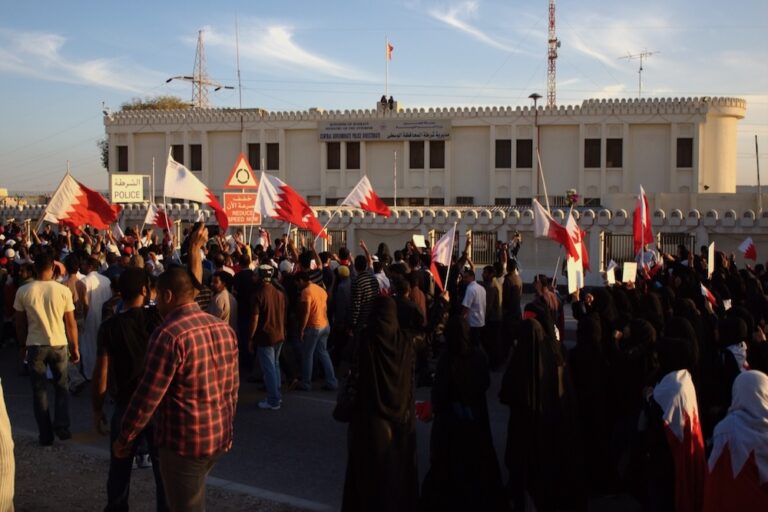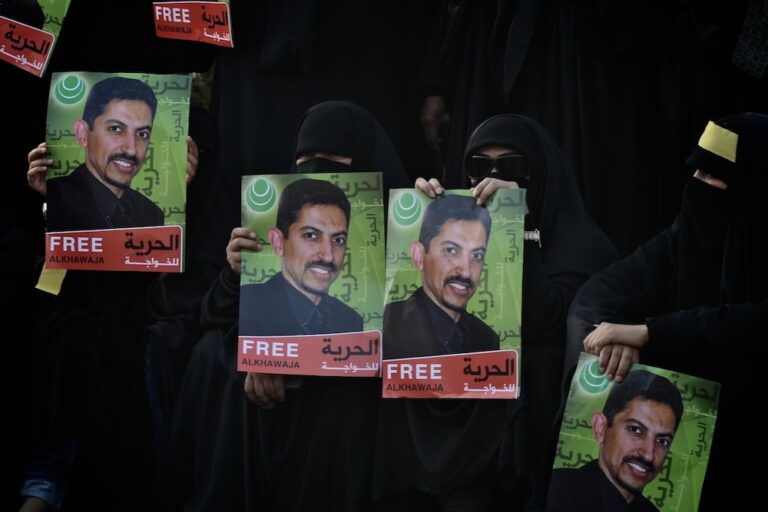Journalists and media are still being prosecuted before military courts, although the state of emergency was lifted on 1 June, notes RSF.
(RSF/IFEX) – 30 June 2011 – Reporters Without Borders accuses the authorities of continuing to crack down on journalists and media freedom in violation of the spirit for the national dialogue that King Hamad Ben Issa Al-Khalifa wants to begin tomorrow with the aim of relaunching political reforms after the unrest that began last March and the ensuing repression.
Journalists and media are still being prosecuted before military courts, although the state of emergency was lifted on 1 June. The authorities are also maintaining strict control over the circulation of news and information and are pumping out propaganda aimed at both Bahraini and foreign media.
Reporters Without Borders calls for a response from the international community that includes the dispatch of a United Nations special rapporteur to Bahrain.
Bahrain Society of Photography president Mohamed Salman Al-Sheikh, a freelance photographer who was arrested on 11 May, was brought before a military court in Riffa, the second largest city, on 28 June. His family was not told about the hearing and therefore was unable to organize his defence. No information has been released about the charges being pressed against this journalist, who has won many international awards.
Abbas Al-Murshid, a freelance journalist and writer who was arrested on 16 May, was brought before a judge on 27 June and was told that he was charged with participating in illegal demonstrations, disseminating false information on online forums and inciting hatred against the government. His request to be freed on bail was denied. Security officers present in the courtroom refused to let his wife and lawyer talk to him although the judge had given his permission. He is to be tried by court martial on 7 July.
Abdullah Alawi and Jassem Al-Sabbagh, two journalists who were arrested after being forced to resign from the newspaper Al-Bilad, are being prosecuted on charges of publishing false information and photos, and participating in illegal demonstrations. The second hearing in their trial was held on 23 June.
As already reported, a military court imposed jail sentences on 22 June on 21 people accused of belonging to terrorist organizations and trying to overthrow the government. Eight of them, including the human rights activist and blogger Abduljalil Al-Singace, were given life sentences. The other 13 got sentences ranging from two to 15 years in prison. The blogger Ali Abdulemam, who was tried in absentia, got 15 years.
The authorities are keeping reporting about the ongoing trials under strict control, maintaining a ban on coverage of national security cases. The government news agency BNA publishes a daily summary of some of the ongoing trials, but trials involving any journalists other than those with Al-Wasat are usually ignored.
The authorities announced on 14 June that they were going to bring a lawsuit against British journalist Robert Fisk, the London-based Independent’s Middle East correspondent, in the United Kingdom for waging a “defamatory and premeditated media campaign” against Bahrain and for alleged bias and unprofessionalism in his coverage of recent events.
Fisk has repeatedly criticized the trials of doctors and nurses accused of supporting the anti-government protests. He also reported that Saudi military forces invaded Bahrain without waiting for an invitation from the Bahraini authorities.
Reporters Without Borders hails the release of Faysal Hayyat, a sports journalist who was arrested on 8 April, although he is still facing charges of “sports crimes.” A military prosecutor issued a statement saying he would be tried according to established legal procedures. No trial date has so far been announced.
The blogger Ali Omid has also been released but seven other netizens and eight journalists, including three photographers, continue to be detained.


